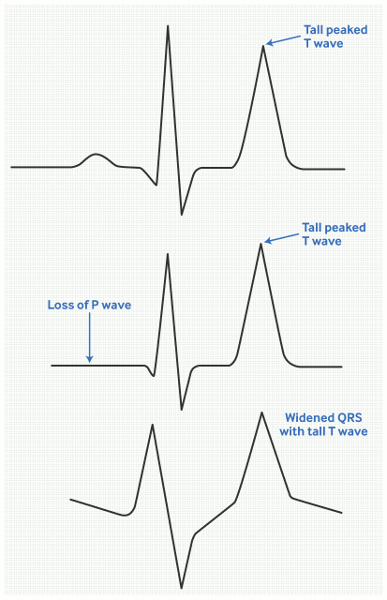Summary
Differentials
Common
- Chronic kidney disease
- Diabetic ketoacidosis/hyperosmolar hyperglycemic state
- Drug-related decreased cellular entry or increased cellular exit of potassium
- Potassium supplementation with underlying renal dysfunction
- Drug-related reduced urinary potassium excretion
Uncommon
- Acute kidney injury
- Renal tubular acidosis
- Metabolic acidosis
- Congenital adrenal hyperplasia
- Addison disease
- Pseudohypoaldosteronism
- Hyperkalemic periodic paralysis
- Tumor lysis syndrome
- Rhabdomyolysis
- Pseudohyperkalemia
- Ureterojejunostomy
Contributors
Authors
Sri G. Yarlagadda, MD
Associate Professor
Kidney Institute
The University of Kansas Medical Center
Kansas City
KS
Disclosures
SGY declares that she has no competing interests.
Acknowledgements
Dr Sri G. Yarlagadda would like to gratefully acknowledge Dr Domenic Sica, a previous contributor to this topic. DS declares that he has no competing interests.
Peer reviewers
Manish Suneja, MD
Assistant Professor
Department of Internal Medicine
Division of Nephrology
University of Iowa Hospital and Clinics
Iowa City
IA
Disclosures
MS declares that he has no competing interests.
Raj Thuraisingham, MBBS, MRCP, FRCP, MD
Consultant Nephrologist
Royal London Hospital
London
UK
Disclosures
RT declares that he has no competing interests.
Peer reviewer acknowledgements
BMJ Best Practice topics are updated on a rolling basis in line with developments in evidence and guidance. The peer reviewers listed here have reviewed the content at least once during the history of the topic.
Disclosures
Peer reviewer affiliations and disclosures pertain to the time of the review.
References
Key articles
Lott C, Truhlář A, Alfonzo A, et al. European Resuscitation Council guidelines 2021: cardiac arrest in special circumstances. Resuscitation. 2021 Apr;161:152-219.Full text Abstract
Panchal AR, Bartos JA, Cabañas JG, et al. Part 3: adult basic and advanced life support: 2020 American Heart Association guidelines for cardiopulmonary resuscitation and emergency cardiovascular care. Circulation. 2020 Oct 20;142(16_suppl_2):S366-468.Full text Abstract
Deakin C, Soar J, Davies R. Resuscitation Council UK. Special circumstances guidelines. May 2021 [internet publication].Full text
Rafique Z, Peacock F, Armstead T, et al. Hyperkalemia management in the emergency department: an expert panel consensus. J Am Coll Emerg Physicians Open. 2021 Oct 1;2(5):e12572.Full text Abstract
Rossignol P, Legrand M, Kosiborod M, et al. Emergency management of severe hyperkalemia: guideline for best practice and opportunities for the future. Pharmacol Res. 2016 Nov;113(pt a):585-91. Abstract
Reference articles
A full list of sources referenced in this topic is available to users with access to all of BMJ Best Practice.
Use of this content is subject to our disclaimer

